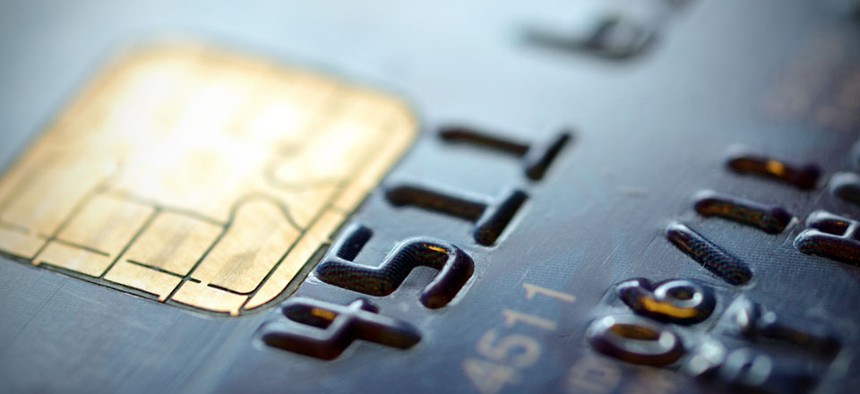Obama Orders Two-Step IDs to Combat Credit Card Hacks

Hamik/Shutterstock.com
The executive order also requires agencies to switch to multifactor authentication to access sites that store citizens' personal information.
President Barack Obama took action Friday to stop rampant credit card breaches by requiring federal agencies to issue government purchase cards embedded with hacker-resistant microchips that require PIN numbers for charges.
By wielding the power of the purse -- 1 million payment cards for starters -- the government aims to stimulate the market for so-called chip-and-PIN cards.
Government-issued credit cards, provided by Citibank, JPMorgan and U.S. Bank, cover work expenses, such as train tickets and meals.
The technology, which abandons magnetic strips, has suffered from a chicken and egg problem, according to senior cyber officials.
Transitioning to chip-and-PIN is because, "in the past when companies have tried to roll this out, there’s been a feeling that there weren’t enough readers out there to make the chips work and then there weren’t enough chips out there to make the readers work. So nobody really wanted to invest in it," a senior administration official, who was not authorized to speak on the record, told Nextgov.
Officials on Friday could not provide a funding figure for the effort.
An executive order the president issued Friday will install the technology in newly issued and existing government credit cards, plus debit cards issued to citizens for benefits.
“You should be able to buy the things that you need without risking your identity, your credit score or your savings,” Obama said at brief speech at the Consumer Financial Protection Board to announce the policy.
His “Buy Secure” program also mandates modifying registers at post offices, passport offices, Department of Veterans Affairs canteens, national parks and other government facilities so they accept citizens’ own chip-and-PIN cards.
Major retailers, including Home Depot, Target and Walmart, are expected to do the same by January 2015 at their checkout lines. Federal officials anticipate that by January 2016, the government will issue more than 1 million secure federal payment cards.
"The idea that the government is going to switch over its millions of cards is demonstrating leadership in moving this in the direction we have to move in,” the official said.
Cards with these microchips, which contain scrambled code indecipherable to intruders, are almost ubiquitous in Europe.
Identity thieves during the past year have plundered more than a hundred million card numbers at retailers such as Target, Home Depot and Dairy Queen by infecting their payment systems with malware that siphons off data from magnetic strips.
The move to pin-and-chip is part of a larger strategy to abolish one-step identification checks.
A separate piece of the executive order will require citizens to use at least two types of ID when accessing their personal information on federal websites, such as IRS.gov.
"Multifactor authentication" is another security measure the commercial world has been slow to embrace.
Twitter and Apple iCloud backups, for example, didn't offer the service until hackers cracked high-profile user accounts.
The government has a long-term plan to discard passwords across cyberspace, called the National Strategy for Trusted Identities in Cyberspace, or NSTIC.
Following Friday's move, "consistent with NSTIC, agencies will require multiple-factor authentication of users to get back their own personal information that the government has on them," the senior official said. "We’re ensuring that if someone is asking for personal information about individuals -- that they are using multifactor authentication."
Other forms of ID could, perhaps, include a fingerprint touch or one-time password sent to the authorized user’s smartphone, he said.
Agencies must enable multistep logins on sites by April 17, 2016, according to the order.
Obama also nudged Congress to negotiate cybersecurity reforms the White House introduced more than three years ago.
There is no national law requiring organizations to notify breach victims in a timely manner. Also, businesses often are reluctant to share information about hacks with government response teams for fear of being held liable. In addition, legal issues surrounding customer privacy dissuade companies from, for example, asking the National Security Agency for assistance.
“Even though I’m taking action today without Congress, Congress needs to do its part, as well,” Obama said. "Today, data breaches are handled by dozens of separate state laws, and it’s time to have one clear national standard that brings certainty to businesses and keeps consumers safe.”
The banking industry backed Obama's push to change the U.S. credit card system, but said more improvements are needed.
“Advancing payment technologies, information sharing legislation, and collaboration between the financial industry, merchants and the federal government are all critical steps to ensuring our shared customers and the economy can stay one step ahead of cyberattacks,” Jason Kratovil, vice president of government affairs for payments at the Financial Services Roundtable, said in a statement.
(Image via Hamik/Shutterstock.com)
NEXT STORY: Tightening security on federal payment cards






